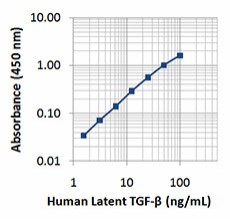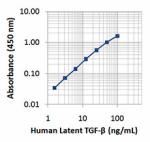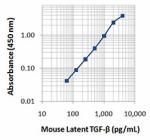- Clone
- TW7-7H4 (See other available formats)
- Regulatory Status
- RUO
- Other Names
- Latent TGF-β1, Latent TGFβ, Latent TGFβ1, LTGF-β1, LTGF-β, LTGFβ1, LTGFβ, Latent transforming growth factor beta
- Isotype
- Mouse IgG1, κ
- Ave. Rating
- Submit a Review
- Product Citations
- publications

| Cat # | Size | Price | Quantity Check Availability | Save | ||
|---|---|---|---|---|---|---|
| 361203 | 100 µg | 216€ | ||||
| 361204 | 1 mg | 595€ | ||||
Latent TGF-β is secreted as a complex consisting of LAP and TGF-β1. LAP and TGF-β1 are synthesized as a single propeptide precursor of 390 amino acids with an N-terminal signal peptide of 29 amino acids, a 249 amino acids pro-region (LAP), and a 112 amino acids C-terminal region (TGF-β1).
Both LAP and TGF-β1 exist as homodimers in circulation, but the disulfide linked homodimers of LAP and TGF-β1 remain non-covalently associated, forming the small latent TGF-β complex (SLC, 100 kD). The large latent TGF-β complex (LLC, 235-260 kD) contains a third component, the latent TGF-β binding protein (LTBP), which is linked to LAP by a single disulfide bond. LTBP does not confer latency but is for efficient secretion of the complex to extracellular sites.
TGF-β1 and LAP can be released (activated) by many factors, including enzymes and low or high pH. TGF-β1 and LAP have multiple functions, such as regulating proliferation and differentiation of various cell types.
Increased production and activation of latent TGF-β have been linked to immune defects associated with malignancy and autoimmune disorders, susceptibility to opportunistic infection, and to the fibrotic complications associated with chronic inflammatory conditions.
Latent TGF-β has been found to protect against glomerulonephritis. It is also a surface marker of activated regulatory T cells.
Product Details
- Verified Reactivity
- Human, Mouse
- Antibody Type
- Monoclonal
- Host Species
- Mouse
- Immunogen
- Mouse Latent TGF-β
- Formulation
- 0.2 µm filtered in phosphate-buffered solution, pH 7.2, containing no preservative.
- Endotoxin Level
- Less than 0.01 EU/µg of the protein (< 0.001 ng/µg of the protein) as determined by the LAL test.
- Preparation
- The Ultra-LEAF™ (Low Endotoxin, Azide-Free) antibody was purified by affinity chromatography.
- Concentration
- The antibody is bottled at the concentration indicated on the vial, typically between 2 mg/mL and 3 mg/mL. Older lots may have also been bottled at 1 mg/mL. To obtain lot-specific concentration and expiration, please enter the lot number in our Certificate of Analysis online tool.
- Storage & Handling
- The antibody solution should be stored undiluted between 2°C and 8°C. This Ultra-LEAF™ solution contains no preservative; handle under aseptic conditions.
- Application
-
ELISA Capture - Quality tested
- Recommended Usage
-
Concentrations of 1 µg/mL and 0.5 µg/mL of the capture antibody were utilized to generate the example standard curves for human latent TGF-β and mouse latent TGF-β, respectively. It is recommended that each lot of reagent be titrated for optimal performance for each application.
- Application Notes
-
ELISA Capture:
To measure human latent TGF-ß, this antibody can be used as a capture antibody in sandwich ELISA format, and paired with the biotinylated TW4-6H10 antibody (Cat. No. 349707) as the detection antibody. Recombinant human latent TGF-ß (ELISA Std.) (Cat. No. 593509) can be used as the protein standard.
To measure mouse latent TGF-ß, this antibody can be used as a capture antibody in sandwich ELISA format, and paired with the biotinylated TW7-16B4 antibody (Cat. No. 141411) as the detection antibody. Recombinant mouse latent TGF-ß (ELISA Std.) (Cat. No. 594509) can be used as the protein standard.
Note: For testing human latent TGF-ß in serum, plasma or supernatant, LEGEND MAX™ Human Latent TGF-ß ELISA Kit (Cat. No. 432907) is specially developed and recommended. For testing mouse latent TGF-ß, LEGEND MAX™ Mouse Latent TGF-ß ELISA Kit (Cat. No. 433007) is recommended. - Product Citations
-
- RRID
-
AB_2888885 (BioLegend Cat. No. 361203)
AB_2888885 (BioLegend Cat. No. 361204)
Antigen Details
- Structure
- Homodimer
- Distribution
-
Latent TGF-β is secreted by numerous cells, and activated Treg cells.
- Function
- Latent TGF-β is the inactive form of TGF-β1 and LAP.
- Ligand/Receptor
- Latent TGF-β binding proteins (LTBPs)
- Cell Type
- Tregs
- Biology Area
- Apoptosis/Tumor Suppressors/Cell Death, Cell Biology, Cell Cycle/DNA Replication, Immunology
- Molecular Family
- Cytokines/Chemokines, Growth Factors
- Antigen References
-
1. Lu M, et al. 2002. J. Cell Sci. 115:4641.
2. Khalil N. 1999. Microbes. Infect. 1:1255.
3. Probst-Kepper M and Buer J. 2010. Biol. Direct 5:8.
4. Ali N, et al. 2008. PLoS One 3:e1914. - Gene ID
- 7040 View all products for this Gene ID
- UniProt
- View information about Latent TGF-beta on UniProt.org
Related Pages & Pathways
Pages
Related FAQs
- Do you guarantee that your antibodies are totally pathogen free?
-
BioLegend does not test for pathogens in-house aside from the GoInVivo™ product line. However, upon request, this can be tested on a custom basis with an outside, independent laboratory.
- Does BioLegend test each Ultra-LEAF™ antibody by functional assay?
-
No, BioLegend does not test Ultra-LEAF™ antibodies by functional assays unless otherwise indicated. Due to the possible complexities and variations of uses of biofunctional antibodies in different assays and because of the large product portfolio, BioLegend does not currently perform functional assays as a routine QC for the antibodies. However, we do provide references in which the antibodies were used for functional assays and we do perform QC to verify the specificity and quality of the antibody based on our strict specification criteria.
- Does BioLegend test each Ultra-LEAF™ antibody for potential pathogens?
-
No, BioLegend does not test for pathogens in-house unless otherwise indicated. However, we can recommend an outside vendor to perform this testing as needed.
- Have you tested this Ultra-LEAF™ antibody for in vivo or in vitro applications?
-
We don't test our antibodies for in vivo or in vitro applications unless otherwise indicated. Depending on the product, the TDS may describe literature supporting usage of a particular product for bioassay. It may be best to further consult the literature to find clone specific information.
Other Formats
View All Latent TGF-β Reagents Request Custom Conjugation| Description | Clone | Applications |
|---|---|---|
| Ultra-LEAF™ Purified anti-human/mouse Latent TGF-β | TW7-7H4 | ELISA Capture |
Compare Data Across All Formats
This data display is provided for general comparisons between formats.
Your actual data may vary due to variations in samples, target cells, instruments and their settings, staining conditions, and other factors.
If you need assistance with selecting the best format contact our expert technical support team.
 Login / Register
Login / Register 












Follow Us